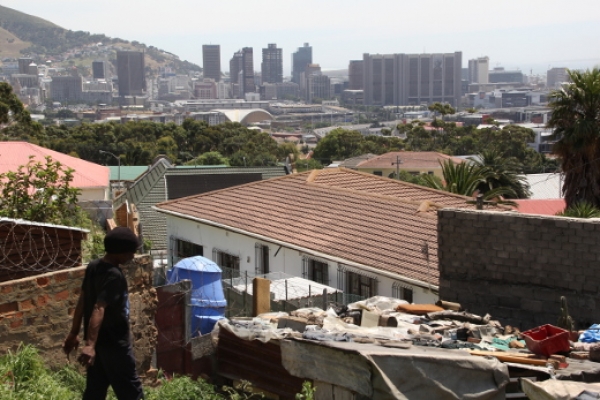After decades in Walmer Estate, residents face eviction

Sixteen shack-dwellers, including four children, will be left homeless when the sheriff enforces an eviction order in Walmer Estate this week.
Although the eviction order may be “legally” obtained, an eviction that renders a family homeless is inherently unconstitutional, a Stellenbosch University human rights law expert has warned.
Michael Pedro, 31, has packed his clothes into a suitcase with a broken zipper and stacked his belongings outside his shack door. He knows that he, his partner and her young son will have their home torn down and carted away on a truck this week. Yet, there is no place further than the pavement outside 3B Cambridge Road, where he has lived since adolescence, for Pedro to take his effects and his family.
“We know that the time has come, and that the sheriff has been given permission by the court to break our ‘hokkie’ down,” he said, sitting outside the shack with Moegamath, 3, on his lap and a puppy at his feet.
The sheriff was expected on Monday, but did not arrive. But with an eviction order recently handed down in the Cape Town Magistrates’ Court and a landowner eager for it to be enforced, Pedro and his neighbours know that it’s only a matter of time.
“We’re kind of helpless, waiting for that moment. It’s sad, because this is the only home I have ever known.”
But, he says there is no time to mourn because “we have a child to think about … we have no place to go.”
On Tuesday, the sheriff came for the belongings of Michael’s father and neighbour, 63-year-old Michael Simmery who has lived there for 38 years. His possessions were stacked on the pavement, and the sheriff left with a warning that a gate would soon be installed to lock the occupiers out and to secure the property. Late on Tuesday, Simmery and his son carried his things back to his home.
The shacks in which Simmery live alongside 15 other people, nestled on a plot of private land behind double storey houses in Walmer Estate, an area with prime views over the Cape Town CBD, the mountain and Table Bay, are to be destroyed.
53-year-old Joe Bezuidenhoudt has lived there for 25 years. “It is a built-up neighbourhood now, and houses have become bigger and more expensive,” says Bezuidenhoudt.
“But we have been here since this was mostly bush. Here I made a life for myself, fixing cars and doing odd jobs. Now, at a time when my body is failing and I can no longer care for myself, I have to face homelessness as well. We will move, if we must. All we need is a little plot and we can put up our shacks again. But no such thing has ever been offered to us.”
Michael Simmery, 63, carries his possessions back to the shack in which he has lived for 38 years. He and 15 other long term occupiers of a plot in Walmer Estate stand to be evicted by the sheriff of the court this week. Photo by Daneel Knoetze.
Bezuidenhoudt is poor and accustomed to a life without amenities. He has never lived in a “house” he says. The five shacks at 3B Cambridge are without electricity, and years of cooking on an open fire has turned the three-metre high wall that separates them from their neighbour jet black. It is only in recent years that the City of Cape Town has installed a tap and two flush toilets on the plot.
Bezuidenhoudt says arthritis has disabled him from working as a handyman. He demonstrates the stiffness of his emaciated right arm and disproportionately swollen hand.
“Our whole lives are here. We may not live in houses, but we are as much a part of this community as anyone. We have young children here who are being educated at Rahmaniyeh (a primary school nearby),” he said.
The families’ Cambridge Street neighbour, 65-year-old Moghamat Garnie, who lives in a property overlooking the shacks, agrees. Bezuidenhoudt and his fellows are good workers and considerate neighbours, he says.
Coen van Graan, the attorney representing Ismail Ryklief, the property’s owner since 2009, contends that the correct application process for an eviction order was followed, and that the occupiers had lawyers provided through legal aid and enough time to search for alternative accommodation.
In his founding affidavit to the court, Ryklief named the City and then Mayco member for Human Settlements Tandeka Gqada as respondents and requested a report on the availability of alternative land for the occupiers to erect shacks. Van Graan confirmed that the City had legal representation.
At the time of publication, the City was not ready to comment on its involvement in the case or on whether there was any recourse for the Pedro, Bezuidenhoudt and ten other evictees to avoid homelessness.
Meanwhile Sandra Liebenberg, the H.F. Oppenheimer Chair in Human Rights Law at Stellenbosch University, confirmed a general principle of section 26 of South Africa’s Constitution: that the right to adequate housing implies that an eviction should never lead to homelessness.
“The Constitutional Court has made it clear that municipalities have a duty to provide alternative accommodation to those in urgent housing need. Courts faced with eviction applications should call for evidence in order to be satisfied that homelessness will not result as a consequence of an eviction order. This includes requiring municipalities, landowners and occupiers to engage with each other meaningfully on ways to ensure that impoverished and vulnerable groups are not left without a roof over their heads.”
Support independent journalism
Donate using Payfast

Don't miss out on the latest news
We respect your privacy, and promise we won't spam you.

This article is licensed under a Creative Commons Attribution-NoDerivatives 4.0 International License.
